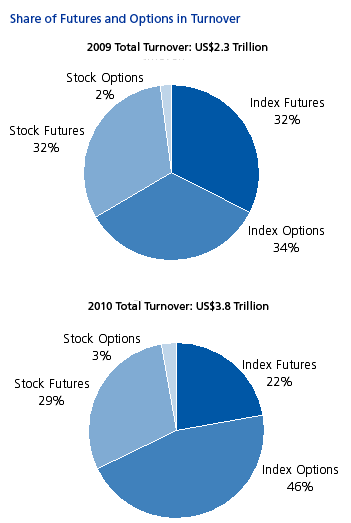The Indian secondary equity markets are different from most of their global counterparts because pre-trade risk management plays a very important role in their functioning. In this system, collateral is deposited with the exchange to cover trades undertaken by a broker’s clients.
In a new report, Lessons from Pre-Trade Risk Management in the Indian Equity Markets, Celent describes the current risk management practices in the Indian equity cash and derivative markets. While the practitioners are satisfied with the risk management system (RMS), there are certainly some improvements that could be made, such as greater flexibility for the brokers within the framework of the overall norms. At the same time, the robust pre-trade RMS in the Indian markets offers an interesting opportunity for market regulators and participants elsewhere to learn, and perhaps even to integrate into their systems.
In turnover terms, the derivatives market in NSE (the main equity derivatives exchange) has shown 64% growth from US$2.3 trillion in FY 2009 to US$3.8 trillion in FY 2010. Notably, the share of index options has risen from 34% to 46%, while index futures have declined from 32% to 22%. Importantly, this market requires a strong risk management system to cater to the fast growth as well as the ever-changing composition of the products within the futures and options market.

“Indian risk management practices offer an interesting alternative to some of the existing risk management systems in the leading global markets,” says Anshuman Jaswal, Celent, Senior Analyst and author of the report. “Hence, this risk management framework could prove to be useful for the regulators and exchanges that are interested in reducing systemic risk through more effective pre-trade regulation.”





